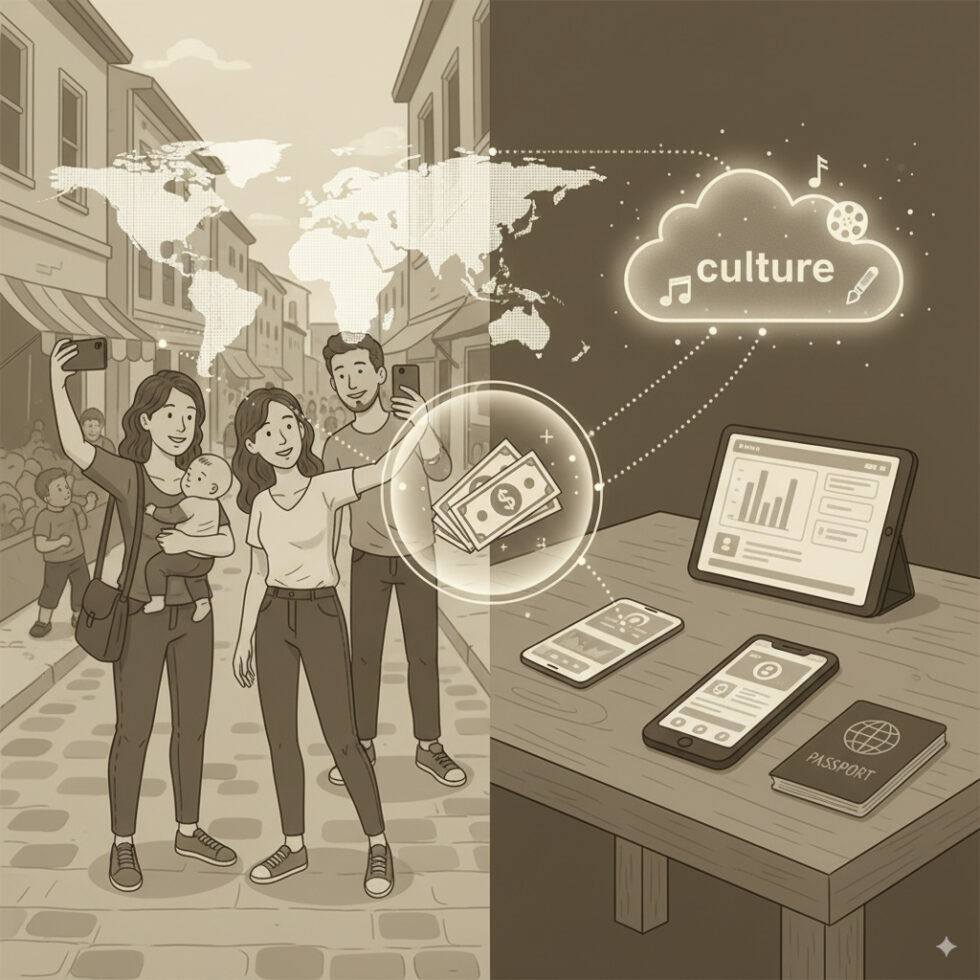
The world does not feel “far away” anymore. It feels like a neighborhood—one that stretches across time zones and customs lines, group chats and parcel lockers. In that neighborhood, people do everyday things: send money and gifts, share recipes and news, plan school fees, translate health advice, and organize festivals. All of it adds up to a quiet but powerful force shaping society: culture logistics.
By culture logistics, we mean the routines and tools that let families, communities, and small businesses move care, culture, and commerce across borders. It is not a single app or a flashy technology. It is the practical layer under real lives: remittances that pay a utility bill, a consolidated box that brings favorite snacks home, a bilingual livestream that teaches a craft in two languages at once, a community shop that turns WhatsApp orders into courier labels.
This article explores how culture logistics works, why it matters now, and how to use it well. We focus on clear playbooks and real examples rather than hype. You will meet the three flows that power global neighborhoods—money, stuff, and stories—and the simple habits that keep these flows safe, humane, and sustainable.
What Is Culture Logistics?
Every border has a human side. Even when goods and rules get complex, people find simple routines that fit daily life. Culture logistics is that layer of routines. It turns distant relatives into near neighbors, and it helps local shops serve global tastes. You can see it in airports where people carry extra bags filled with gifts, in group chats where fees and exchange rates are discussed, and in festival markets where a city discovers flavors from far away.
Three flows drive it:
- Money: family support, shared budgets, fee payments, and credit gifted across borders.
- Stuff: parcels, consolidated boxes, groceries, festival supplies, and tools for work or school.
- Stories: language help, health advice, recipes, local rules, and trusted news interpreted for a new place.
These flows are not new. What’s new is how organized they have become. Today, small groups use group spreadsheets, storefront chats, pickup lockers, and shared calendars to coordinate across time zones. Shops learn to stock diaspora staples. Creators teach live, then ship kits to learners around the world. Families build monthly routines that include a remittance, a shared shopping list, and a call to review bills.
Put together, these actions form a system. It is not central. It is distributed. It is resilient because it is simple. And it is getting smarter because people keep improving it with tiny tweaks that save time, money, and stress.
Money That Feels Like Care
When people move, their support does not stop at a border. It adapts. Remittances are the most visible form of that support, but the story is bigger. Money has memory. It carries intent, context, and often a promise. The more money flows reflect those realities, the better they fit real lives.
Beyond a Single Transfer
One-off transfers still matter, but many families now use structured support. Think in terms of “care bundles” rather than a single send:
- Recurring essentials: a monthly send aligned with rent, tuition, or a clinic visit date.
- Directed support: topping up an electricity account or paying a school directly.
- Gifted value: grocery credits, transport passes, or data plans that stretch a budget further.
- Shared goals: a group fund for a family event or a renovation, with notes on milestones.
These patterns reduce stress. They match how people plan. They also create a gentler rhythm: less panic, more predictability.
Why “Proof” Builds Trust
Trust is personal, but in global flows it also becomes visible. Receipts, photos of paid bills, and clear notes (“April: school fee + shoes”) help everyone stay aligned. Many families keep a shared folder for screenshots and timelines. It is not about surveillance; it is about clarity and gratitude: “Here is what that help did.”
In community groups, simple reputation systems emerge. Someone who is reliable at organizing bus tickets or paying school bills gets asked again. People do this informally, and it works because the stakes are shared and the circle is small.
Practical Habits for Smoother Support
- Pick a rhythm: match sends to due dates. Add a reminder at least five days early.
- Label the intent: write the purpose in the transfer note. It reduces confusion later.
- Split critical bills: if a single payment is large, break it into two smaller sends a week apart.
- Keep a simple log: a shared note with date, amount, purpose, and confirmation. It takes one minute.
- Map alternatives: have a backup channel listed for emergencies.
These are humble steps. They also deliver peace of mind. In culture logistics, clarity is kindness.
Shipping Culture: Parcels, Groceries, and Taste Corridors
The second flow is physical. It is the comfort of a tea from home. It is tools that make work easier. It is a costume for a dance at a festival far from where it started. To move these items well, communities build their own logistics—often on top of mainstream courier networks.
The Consolidated Box
Consolidation is a simple idea: combine many small packages into a larger shipment to cut cost and reduce hassle. It shows up in the “balikbayan box” tradition, in campus groups sending care packages, and in shops that collect orders until they can fill a pallet.
A good consolidator offers clear timelines, item restrictions, and pickup points. They publish what cannot be shipped and what must be declared. They send status updates. The best ones reduce friction at customs by keeping documentation clean and predictable.
The Community Shipping Playbook
- Choose carefully: ask friends who shipped last month, not last year. Rules change fast.
- Pack for inspection: label items inside and out. Use clear bags for small goods.
- Declare plainly: honest descriptions and estimated values help avoid delays.
- Cushion the essentials: protect fragile items and separate liquids in sealed bags.
- Share the timeline: tell recipients about the window, not a single date. Weather and checks happen.
None of this is fancy. It is just order. But that order saves weeks later.
Taste Corridors and Local Shops
Follow the trail of specific items—spices, noodles, special flour—and you find “taste corridors.” A corridor connects farms, ports, wholesalers, community shops, and home kitchens. Local shop owners become cultural logisticians. They learn customs rules and shelf-life science. They translate labels. They test how to keep costs fair when shipping times shift.
These shops also run quiet services that never appear on a banner ad: pooled orders for a festival, emergency deliveries for a newborn, or a box of pantry staples for an elder who cannot travel. People remember that level of care. It turns customers into neighbors, and neighbors into a steady network.
Festivals and Pop-Ups
Culture logistics scales up for festivals. Music gear needs permits. Foods need a cold chain. Volunteers need clear roles. A successful event starts months early with a simple checklist:
- Supplies: flagged by customs sensitivity (like dried meats or seeds) and shelf life.
- Roles: who is on customs paperwork, who gets the package, who handles returns.
- Translations: signs for allergen info, directions, and emergency contacts.
- Waste plan: how to clean up and where to donate surplus.
When done well, a festival is not just a show; it is a lesson in how to live together. The logistics become part of the culture itself.
Language as Infrastructure
Language shapes what is possible. It determines who understands, who participates, and whose safety improves. In global neighborhoods, translation is not a luxury. It is infrastructure.
Small, Useful Translation
Big media deals with dubbing and captions. Everyday logistics deals with micro translations: a clinic instruction sheet, a school field trip form, an apartment lease clause, a local tax reminder. Communities handle these needs in practical ways:
- Message templates: pre-written notes for rent questions, job referrals, or school messages, each in two languages.
- Glossaries: common terms for housing, banking, and healthcare in a shared doc.
- Peer review: one person drafts, another checks tone and accuracy.
Creators play a part too. They host bilingual livestreams and share slides with mirrored captions. They post short clips that teach one phrase and one scenario at a time. Focused, repeatable formats help more than a once-a-year lecture.
Moderating Across Languages
Group chats and community forums work better with shared norms. These are simple rules tuned to language realities:
- Be literal about dates and fees: avoid idioms that confuse outsiders.
- Mark updates: add “Update:” at the start of a correction to limit rumor spread.
- Use links to official pages: do not rely on screenshots alone for critical info.
Language is a living thing. The best groups treat translation as a team sport, not a technical chore.
Care Across Borders: Schooling, Health, and Rituals
Global neighborhoods share care as much as goods. This includes school choices, study help, health decisions, and rituals that anchor identity. Care logistics do not need fancy tools. They need respect, consistency, and a clear record of who will do what.
School Support
Remote tutoring can be as simple as a weekly call. Add a quiet corner, a shared folder for assignments, and a fixed time with backup dates. Build a small reward system that acknowledges effort, not just grades. For major choices—like switching schools—organize one review call with all voices present, and end with a written summary.
Health Navigation
Medical advice should stay between professionals and families. But practical things help: translating appointment reminders, organizing transport, listing medication names across languages, and preparing a short health history in the local language. If you support someone from afar, keep a one-page “care card” with allergies, medicines, clinic contacts, and emergency numbers. Store it safely and update it after appointments.
Rituals and Milestones
Rituals are logistics, too. A naming ceremony, a memorial, a pilgrimage, a coming-of-age event—each needs calendars, roles, supplies, and a plan for elders or people with mobility needs. Teams can use the same basics as for festivals: who does what, what is needed, and how to handle surprises kindly. Also, document with consent. Photos and videos are precious. Ask before you share. Keep private albums for family and a separate set for public posts.
City and Business Readiness
As neighborhoods become global, cities and businesses quietly retool. This is not about slogans. It’s about signs that point the right way, forms that do not confuse, and shelves that reflect who is here. Global neighborhoods thrive when public and private spaces adopt practical, inclusive habits.
City Basics That Help Everyone
- Wayfinding: icons and plain language signs at transit hubs, clinics, libraries, and markets.
- Starter packs: a city’s one-page guide to schools, emergencies, transit cards, and local laws in multiple languages.
- Public digital desks: staffed hours where a human can help with forms or explain rules.
- Community kitchens and halls: rentable spaces with clear booking rules and storage for recurring events.
These steps are not “extras.” They reduce confusion and service costs for everyone, including longtime residents.
Business: Design for Diaspora Customers
People shop for trust as much as for items. A diaspora-aware business earns that trust with a few careful moves:
- Clear shipping policies: show what you can and cannot ship, and where. List expected times by country.
- Labeling: include ingredients and care instructions in the languages most common among your customers.
- Returns and repairs: outline cross-border options, even if limited. Clarity prevents disputes.
- Holiday calendars: publish your hours during major holidays across key regions.
- Community liaisons: one staff member who understands local events and can coordinate group orders or sponsorships.
Small businesses can punch above their weight here. A shop that stocks the right staples and communicates honestly becomes a hub. It gains loyalty that no banner ad can buy.
Digital Tools That Actually Help
Culture logistics loves simple tools that reduce friction. It does not need a new platform every month. It needs a reliable set with predictable behavior.
The Minimal Toolkit
- Shared calendar: color-coded for bills, school dates, festivals, and travel. Reminders for everyone involved.
- Shared folder: receipts, forms, translations, and checklists in one place with clear names.
- Group chat with channels: one for news, one for money, one for shipping. Keep emojis for status (🟢 done, 🟡 pending, 🔴 urgent).
- Simple sheets: expenses and event roles. Columns with owner, due date, status.
- Photo album: private, sorted by person, event, or year. Backed up twice.
These tools are boring in the best way. They are human-proof. They let new helpers join without training. They also prevent the one person who “knows everything” from becoming a bottleneck—or burning out.
Risks, Fees, and Fairness
Global flows face real risks. The goal is not to remove risk, but to reduce it. When in doubt, slow down and verify. When you learn a hard lesson, document it so the group does not repeat it.
Common Pitfalls
- Hidden fees: total costs are what matter. Ask “what arrives on the other side?” not “what do I send?”
- Fake urgency: scammers push a clock. Pause and ask a second person to confirm.
- Customs myths: rules change. Always check current lists of restricted items and value limits.
- Over-reliance on one person: rotate roles and keep shared logs to avoid single points of failure.
- Privacy spills: do not post IDs or health info in public chats. Redact before sharing.
Ethical Basics
- Consent: ask before sharing photos, names, or addresses. “May I share this with the group?” is a powerful sentence.
- Fair cost sharing: consolidate when possible, but do not assume equal budgets. Allow opt-outs without pressure.
- Respect labor: pay the organizer who spends hours packing or translating. Gratitude can be formal.
- Honor returns: mistakes happen. If a shipment fails, communicate and make it right.
Playbooks for Different Roles
Culture logistics is collaborative. Here are lightweight playbooks for common roles. Use them as checklists and adapt to your situation.
If You Are Supporting Family From Afar
- Set a monthly review: 30 minutes to check bills, confirm needs, and adjust plans.
- Bundle value: send a mix of direct payments and credits for essentials to stretch budgets.
- Keep a go-bag list: if you travel, maintain a running list of small items needed at home.
- Back up contacts: alternate phone numbers for key people and services.
If You Run a Community Shop
- Publish a shipping calendar: cutoffs for consolidation, expected departure dates, and holiday delays.
- Map taste corridors: track which items draw repeat visits and where they come from.
- Host micro-clinics: short sessions on packaging, customs, and dietary labeling.
- Celebrate makers: feature producers’ stories so customers value quality and fair pricing.
If You Organize a Cultural Event
- One-page plan: date, venue, suppliers, permits, and contingency steps.
- Roles board: logistics, hospitality, finance, translation, accessibility.
- Supplier pack: label templates, customs tips, and delivery windows.
- Care team: volunteers trained for first aid and respectful conflict handling.
If You Create Content for a Global Audience
- Design for two languages: mirrored slides, captions, or written summaries.
- Use micro-lessons: one task per video, under five minutes, with a downloadable checklist.
- Ship starter kits: pair a lesson with a simple kit that can cross borders.
- Post event recaps: time-stamped links, translations, and a list of materials used.
What to Watch Next
Culture logistics keeps evolving in small, practical ways. Here are trends to watch—not for buzz, but for how they help real lives.
Subscriptions for Support
Some families are moving from ad-hoc sends to “support subscriptions”: a predictable set of payments and credits delivered monthly. This reduces stress, cuts fees over time, and turns care into a routine rather than a scramble.
Creators as Micro Importers
Teachers and artisans who stream lessons are becoming mini importers. They source supplies, certify quality, and ship across borders. Expect more partnerships between creators and local shops that handle pickup and returns. This brings learning and making closer to daily life.
Pickup Networks for Trust
Households often struggle with delivery schedules. Community pickup points—trusted shops and libraries—can solve that. As more businesses recognize diaspora demand, expect clearer policies on where items can be held safely and for how long, with ID checks that respect privacy.
Simple Proofs for Family Ties
Administrative tasks sometimes require proof of a family relationship. People build low-tech proofs: notarized letters, shared calendars, and saved messaging histories. In time, lightweight, privacy-respecting tools may make it easier to prove related facts without oversharing. Until then, keep paperwork tidy and stored securely.
Local Schools as Global Classrooms
Schools in global neighborhoods are quietly adapting materials for bilingual settings, cultural holidays, and parent engagement across time zones. The result is better outcomes for all students, not just new arrivals, because clarity and inclusion help every family stay informed and involved.
Libraries as Logistics Hubs
Libraries already lend tools and host classes. Many now also run document clinics, translation hours, and group shipping advice sessions. Expect more libraries to play this role, bringing order and warmth to tasks that can feel lonely and confusing.
Case Notes: Small Systems, Big Relief
To see how these ideas work, imagine three short scenes.
The Budget Room
A family spread across three cities meets online for 20 minutes every first Sunday. The screen shows a color-coded sheet: green for bills paid, yellow for due this week, red for urgent. Each item has a name next to it. Before the call ends, they write one sentence per person about what they will do next. No big speeches, no guilt. The mood is light, because the system is doing the heavy lifting.
The Festival Pantry
Two shop owners and a cultural association agree on a shipping timeline for a festival. They publish a simple web page with what can be ordered, cutoffs, pickup times, and refund terms if something does not arrive. Volunteers practice labeling in three languages. On the day, a “quiet room” is set aside for elders and children who need a break. People leave fed and rested, and the organizers go home with a clean ledger.
The Learning Loop
A craft teacher runs weekly bilingual streams. Each episode has a material list in two languages and a link to order a simple kit. A local shop handles pickup and returns for tools. Viewers share photos of their work and tips in a group album. The teacher updates a glossary every month with common questions and terms. It is not a fancy “platform.” It is a series of reliable loops that keep the class welcoming and growing.
Why This Moment Matters
Globalization can feel abstract: policy, graphs, headlines. Culture logistics is the antidote. It makes globalization human-scale and practical. It is not perfect. It can be messy. But it produces real wins: bills paid on time, meals that taste like home, safer events, fewer misunderstandings, more chances to learn and earn.
As more cities become mosaics of languages and traditions, the simple systems described here help neighbors thrive. They also reduce avoidable conflict and cost. A clear sign, a labeled box, a shared calendar—it all adds up to a kinder public life.
The heart of culture logistics is a habit: write it down, share it simply, and check it together. Do that, and distant places become closer than you think.
Summary:
- Culture logistics is how communities move care, culture, and commerce across borders through simple, reliable routines.
- Three flows—money, stuff, and stories—power global neighborhoods, and each benefits from clarity and shared tools.
- Remittances work best as predictable “care bundles” with clear intent, records, and backup plans.
- Consolidated shipping, community shops, and “taste corridors” bring favorite goods home while keeping costs manageable.
- Language is infrastructure; micro translations, glossaries, and bilingual formats unlock access and safety.
- Care logistics for school, health, and rituals rely on consent, privacy, and consistent roles.
- Cities and businesses can support global neighborhoods with clear wayfinding, multilingual info, and diaspora-friendly policies.
- Keep the toolkit simple: shared calendars, folders, group chats with channels, and short checklists.
- Manage risks with honest declarations, predictable timelines, and ethical habits that respect people’s time and privacy.
- Watch for trends like support subscriptions, creators as micro importers, trusted pickup networks, and libraries as logistics hubs.





